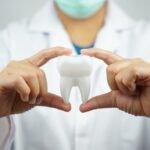Mouth salivating a lot: understand the possible causes and treatments
Many patients have this same question when they arrive at the dental office: “mouth salivating a lot, what could it be?” To answer the question, this content brings together the main causes for the phenomenon that goes beyond the function of salivation in the body — lubrication of the oral cavity — and can indicate serious problems in the mouth and other parts of the body.
Here, you'll understand why excess salivation is worrying and find out what the possible causes of the problem are, from malocclusion - chewing problem - to gastroesophageal reflux, going through anticonvulsant medications, infections and neuromuscular diseases.
Continue reading and learn more about the topic!
Why pay attention to excess salivation?
It is true that saliva plays an important role in the body, as it keeps the mouth lubricated and prevents the proliferation of bacteria in the oral cavity, playing a crucial role in combating caries, for example.
However, the patient should be aware of excessive salivation, as the viscous liquid secreted by the salivary glands can also indicate diseases in the mouth and other organs of the body.
What are the main causes of excessive salivation?
So far, we have seen that excess salivation is alarming. But what are the main causes of the problem? Find it out!
dental malocclusion
Malocclusion occurs when there is misalignment between the teeth, a phenomenon observed mainly by the disengagement of the upper arch in relation to the lower arch.
In addition to causing tooth wear, causing headaches and making it difficult to articulate the jaw, dysfunction strongly impacts the production of saliva by the body.
What to do: The treatment of malocclusion depends on the severity, and can be done by placing an orthodontic device, removing one or more teeth and, in some cases, surgery.
Gastroesophageal reflux
Excessive salivation, stomach burning and poor digestion are the main signs of gastroesophageal reflux, a disease characterized by the return of stomach fluid to the esophagus, larynx and mouth.
What to do: Reflux treatment includes measures such as losing weight and avoiding meals close to bedtime, and the use of medications that reduce stomach acidity. Find out how gastroesophageal reflux is treated.
neuromuscular diseases
Neuromuscular diseases can have a hereditary origin or be acquired by the patient throughout life, strongly affecting the nervous system, which then finds it difficult to transmit movement information through the spinal cord, nerves and muscles of the body.
In this sense, a symptom that may indicate these diseases is excessive salivation.
infections
Excessive salivation may also indicate that the human body is suffering from an infection — caries, gingivitis, periodontitis, among others — since the liquid corresponds to the body's defense in the fight against microorganisms.
What to do: in case of suspected infection, it is important to consult the general practitioner to indicate the most appropriate treatment, which may involve medications such as antibiotics, antivirals and antipyretics. In addition, it is important to drink plenty of fluids and eat a balanced diet.
Medicines
Finally, some medications, such as anticonvulsants and tranquilizers, can encourage excessive saliva production. The same effect is noted when the body is exposed to toxins such as mercury, impacting the patient's salivation.
What to do: the ideal is to consult with the doctor who indicated the treatment to assess whether it is necessary to adjust the dose or suspend possible medications that cause excess saliva. However, in case of suspected ingestion of a toxic product, it is recommended to go to the emergency room.
Pregnancy
During pregnancy, some women may feel their mouth watering a lot, which is common due to nausea and vomiting caused by hormonal changes during this period.
What to do: Mouth watering a lot during pregnancy is normal. But, to relieve nausea and excess saliva, pregnant women can drink ginger and lemon tea and, if they feel too much discomfort, it is important to consult the obstetrician to indicate the most appropriate treatment. Check out how to relieve nausea during pregnancy.
Parkinson's disease
Parkinson's disease can cause symptoms such as tremor, difficulty moving and imbalance. Also, when the disease is advanced, other symptoms may arise, such as difficulty speaking and swallowing, which can make the mouth salivate a lot. Know other symptoms of Parkinson's disease.
What to do: Treatment for Parkinson's disease is usually done with the use of lifelong medications, which help relieve symptoms and slow the progression of the disease.
When to go to the doctor
It is important to see your doctor if:
- Fever;
- Difficulty swallowing or moving;
- Mental confusion, drowsiness or agitation;
- Convulsive crisis;
- Tremor in parts of the body;
- Nausea and vomiting;
- Difficulty breathing;
- Diarrhea.
In these cases, the mouth salivating a lot can have more serious causes, such as intoxication, infection or neurological diseases, such as cerebral palsy or Parkinson's disease, and it is important to identify them to indicate the most appropriate treatment.
How to deal with hypersalivation
The best way to stop your body from producing excess saliva is to address the problem causing the hypersalivation. In many cases, switching medications or getting treatment for medical issues can help resolve excess saliva.
But there are other things you can do to reduce the amount of saliva your body produces:
Avoiding foods and drinks that can stimulate saliva production, for example, can help. Citrus fruits and alcohol in general can decrease saliva production, but the effect can vary from person to person,
change the usual mouthwash for one that does not have alcohol in its formula. Alcohol is a natural dehydrating agent and can "tell" the mouth to produce even more saliva,
Another solution is to stay hydrated to help reduce excess saliva.
Excessive salivation can definitely impair the way you speak, eat, and socialize. By solving the problems that cause this, you can enjoy everything that really makes your mouth water (and not excess saliva).
Conclusion
Okay, now we answer the question: “mouth salivating a lot, what could it be”? In any case, it is always necessary to pay attention to the signs of the body and, if you notice excessive salivation, seek a dentist to assess the condition in a personalized way, since the symptom is associated with several causes in the body.
Click here and get in touch to schedule an appointment.
Take care of your oral health and smile with confidence!
Did you like this information? Then follow Odonto Liuzzi on social media to receive more interesting content like this one!










 per
per